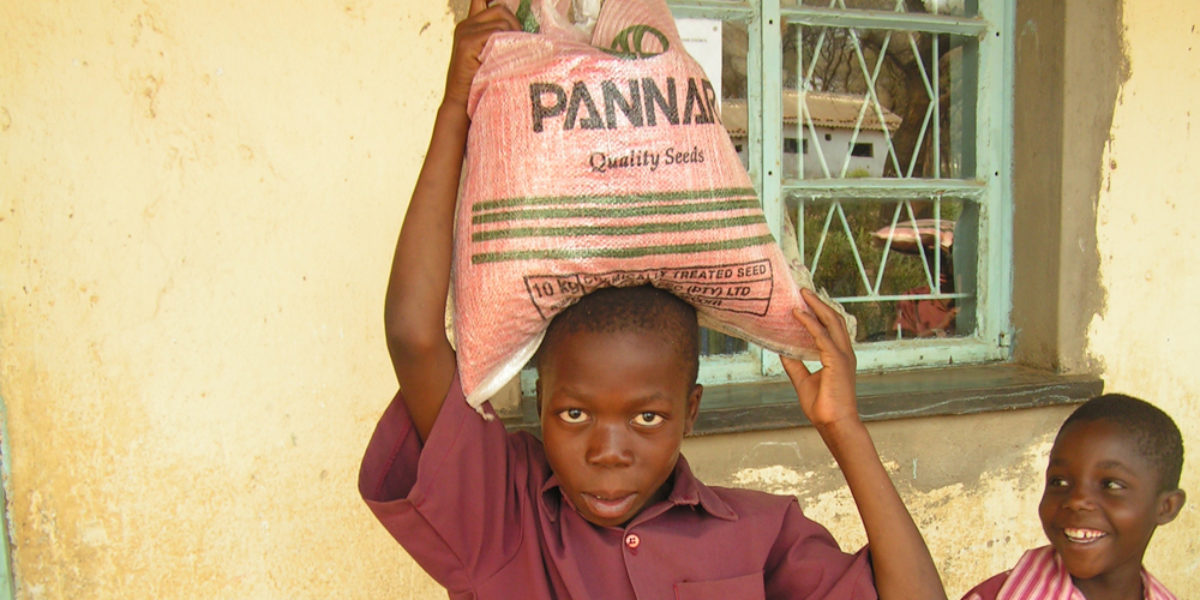Zimbabwe: Food Aid Helps Children Stay in School
12 October 2010

More than six years after JRS Zimbabwe began assisting displaced and extremely vulnerable children, the number has rapidly increased. From 45 children in receipt of food aid in 2004, JRS is now making it possible for nearly 300 children to attend school. Without this food assistance, the children would almost certainly be forced to engage in harmful alternative survival techniques.
Drought, poor agricultural opportunities and a bleak economic climate spells hardship for the poorest citizens of Zimbabwe. With unemployment of approximately 85%, most people find it difficult to sustain their families and live in abject poverty. Some families, particularly in drought-affected areas, are dependent on charity.
The children, from 11 rural schools, receive a comprehensive survival package. JRS provides a ration of maize, cooking oil and multi-purpose soap for each child, to ensure they can come to school clean and fed. In order to support the development of subsistence agriculture in the home to supplement their diet, JRS also distributes vegetable seeds.
In addition, JRS provides practical support to the students by providing them with school uniforms. Refugees at Tongogara camp in Zimbabwe are offered JRS-sponsored sewing courses. Upon completion of the courses, they can earn an income by making school uniforms which are later purchased and distributed by JRS.
Providing Opportunities
The results of this support program have been impressive. School attendance rates are stable. In the past, some children would attend for one month, then the rains would come and they would have to work at home for a month. They miss school to get food. The program is breaking this cycle; it is building a more stable lifestyle for the children.
A letter to JRS Zimbabwe by a 13-year-old student captures the importance of education to these children. “My performance has improved and I can now attend school on a daily basis”. Another child told staff: “without you I would have dropped out of school before grade five”.
The benefits of the project have also been recognized by teachers. One secondary school teacher told JRS: “when we were in a dire situation, you were there to help us…we are greatly indebted to you”.With continued donor support, JRS will continue to assist Zimbabwe’s most vulnerable children with a chance to better their lives and opportunities through completing their schooling.
In the words of a final year student: “I find myself in a situation which I had never hoped for, had it not been for JRS. To think that I find supplies of whatever basic need I may have for the advancement of my education…it seems to be such a miracle”.
Lacking Social Support
Children in Zimbabwe receive very little support, mostly due to the death of parents and guardians. The most vulnerable children often cannot afford necessities such as food, soap and clothing or school fees which provide the luxury of an education. Without income or emotional support, children face a difficult choice: school or work.
The consequences of terminating their education can be severe. Many children believe life across the border is the answer to their problems, as evidenced by the high rate of unaccompanied minors crossing into South Africa. This opens these children up to a range of other dangers, including labor exploitation, human trafficking and police harassment.
NGOs working with minors in South Africa’s towns that border Zimbabwe, speak of boys and girls living and ‘working’ the streets, focused on earning money as opposed to returning to school.



